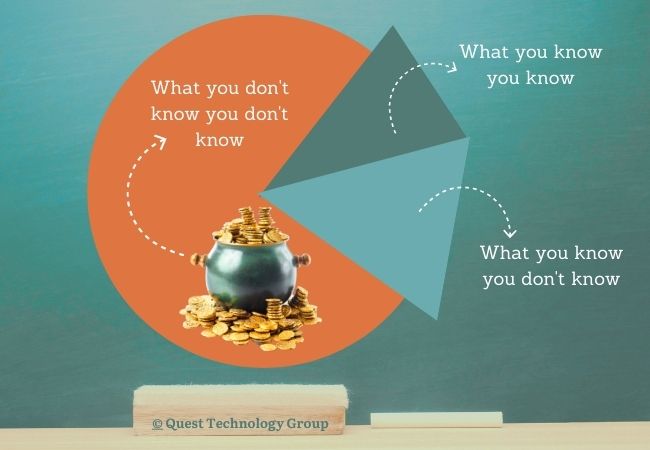How to Know What You Don't Know You Don't Know

Finding information has never been easier, and our ability to ask the right questions never harder. Our curiosity has been hijacked by our impatience for the quick answer.
Sit with that for a minute.
Your Valuable Knowledge Pie
What we're missing is the untapped opportunity hidden in what we don't know we don't know.

We all know how easy it is to get information about anything we want to know.
What If You Were Willing to Slow Down and Learn?
Successful people are curious learners. They take the time to think, to sort random information into context, and ask more questions.
Successful people are continually applying information that makes what you know you know and what you know you don't know larger pieces of their valuable knowledge pie.
Imagine you have a product or service that you believe is a great online offering. Your decision process might begin something like this.
What you know you know
What you know you don't know
What you don't know you don't know
How to Know What You Don't Know You Don't Know
Back to the original subject of this post. We've said this before, but you deserve to hear it often. It's okay to say, "I don't know".
When you say it to the right people, you open the door for opportunities you never knew existed.
1. Challenge your assumptions.
Remember this story I shared recently? Simply checking the corporate bank account convinced this CFO that their company hadn't been breached. Obviously, this was a flawed – and dangerous -- assumption.
Always be asking yourself "Do I know this is the right assumption?"
2. Build a network of reliable knowledge sources.
These are real people you know who have proven experience. The right people are eager to share what they know with you. Call them, email them, explain the problem you're trying to solve. Then sit quietly and listen.
You might not hear what you want to hear, but it will most likely be the right, unbiased answer you need to hear. After all, isn't the ultimate goal to solve the problem that will lead to your desired outcome?
3. Dust off your thinking skills.
Remember back in your school days when you had to write a research paper? Dreaded the whole exercise, right? This torturous paper had to be a certain number of pages, on a specific subject, spacing just so, and your position had to be supported by reliable sources.
Reading and compiling information into a finished work were designed to teach your critical thinking skills.
4. Commit to learning something new every day.
As Charlie Munger, Warren Buffet's longtime sidekick said ---
"In my whole life, I have known no wise people over a broad subject matter area who didn't read all the time - none, zero. You'd be amazed how much Warren reads - and at how much I read. My children laugh at me. They think I'm a book with a couple of legs sticking out.".
5. Realize the expertise in something doesn't make you an expert in everything.
Thanks for Your Tuesday Visit
You're in business to grow and deliver what your customers and clients want most from you.
You've come to the right place. We share information, knowledge, tools, and resources to help you and your business thrive.
Tags: Business Strategy
. . .
 Linda Rolf is a lifelong curious learner who believes a knowledge-first approach builds valuable client relationships. She is fueled by discovering the unexpected connections among technology, data, information, people and process. For more than four decades, Linda and Quest Technology Group have been their clients' trusted advisor and strategic partner.
Linda Rolf is a lifelong curious learner who believes a knowledge-first approach builds valuable client relationships. She is fueled by discovering the unexpected connections among technology, data, information, people and process. For more than four decades, Linda and Quest Technology Group have been their clients' trusted advisor and strategic partner. Linda believes that lasting value and trust are created through continuously listening, sharing knowledge freely, and delivering more than their clients even know they need. As the CIO of their first startup client said, "The value that Quest brings to Cotton States is far greater than the software they develop."
